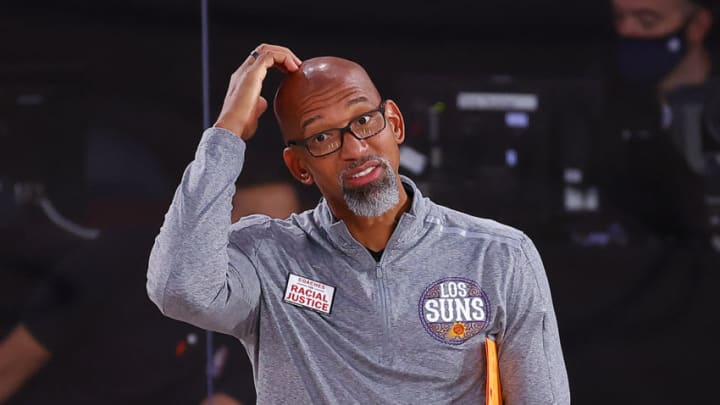Prior to yesterday’s win over the Golden State Warriors, the Phoenix Suns were on a free fall. The Suns had gone 1-5, culminating in two overtime heartbreakers against the Denver Nuggets and a disappointing showing against the Oklahoma City Thunder.
The rough stretch all started with a 128-107 loss against the Washington Wizards, arguably the worst team in the NBA.
In an NBA season of unprecedented change, coaches are more crucial than ever for sustained team success, and Phoenix Suns coach Monty Williams needs to prove himself.
It would be easy to dismiss many of these losses as a result of a shortened training camp, missing key rotation players due to health protocols, or the team needing more time to gel. Those are issues that all teams are facing though as the NBA grapples with the continued impact of COVID-19. More importantly, the count in the loss column fails to show how those losses occurred.
The losses seemed to follow a pattern:
- Suns came out of the gate with high energy and hot shooting behind the arc
- Opponents fought their way back into the game because the Suns couldn’t get defensive stops
- Suns fail to maintain their lead through the fourth quarter and end the game not with a bang, but a whimper
- Even if the shots from distance weren’t connecting, the team continued to rely on Chris Paul pick-and-roll plays to generate more 3-point attempts
Monty Williams has been the one constant for the Suns this year. Williams surely deserves immense credit for turning around the culture in the locker room, but his lineup decisions, failure to make in-game adjustments, and offensive schemes are worth further discussion. Williams has a system in place, but has not shown the ability to pivot if the game plan is not working.
Coaches are a critical component for a stable team and consistent playoff success. The season is still young, but there is an opportunity cost for keeping any coach in place. Making a coaching change sooner rather than later provides more time for his or her relationship with the team to grow organically. Teams need time to buy into a new system. This is all the more important for a team with playoff aspirations.
Williams has garnered somewhat of a reputation as a “players coach.” The perspective Williams has on life after dealing with some truly heartbreaking hurdles in life has seemingly always helped him relate with his players on a more human level. That kind of compassion is all too rare these days and should be lauded whenever possible, especially in professional sports. Is that enough to compete for a championship though?
In reality, head coaches need to maintain the delicate balance of relating with their players while simultaneously keeping the big picture in mind of what is best for the team. Williams has not been able to get the most out of this team when it counts thus far this season. Perhaps leaning on assistant coaches more, additional experimentation, or new set plays could pay dividends for the team later on in the year.
Williams has more than earned the benefit of the doubt, but as we reach the quarter-mark of this abbreviated season, the Suns need to show some more progress. The Paul-Devin Booker backcourt needs to get on the same page, Deandre Ayton has to have more consistent effort, and the offense needs to find ways to break down set defenses before the playoffs.
Yesterday’s win over the Warriors really showcased how deep and solid this Suns team can be. As more and more attention comes to the Suns, the highs provide an even more stark contrast to the lows of the team. If Williams cannot get more consistent effort and results out of the team, he will be feeling the heat sooner rather than later.
